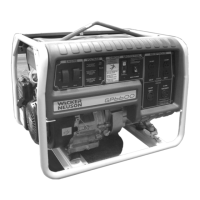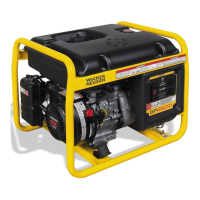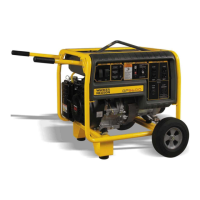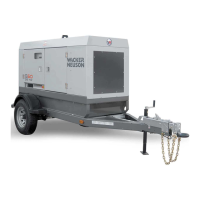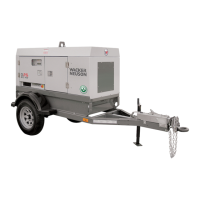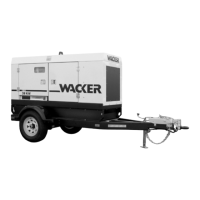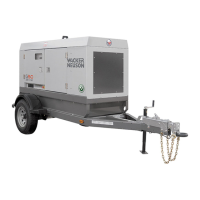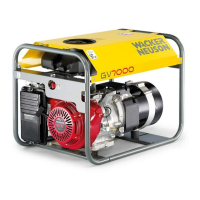Do you have a question about the Wacker Neuson GP 5600A and is the answer not in the manual?
Lists the generator models covered by this operator's manual.
Refers to other manuals like Parts Book and Repair Manual for detailed information.
Outlines the manual's content and procedures for safe operation and maintenance.
Warns about chemicals in engine exhaust and vehicle components known to cause cancer or reproductive harm.
Advises consulting local authorities for laws regarding spark arresters on engines.
Defines approved parts, attachments, and modifications for the machine.
Explains DANGER, WARNING, CAUTION, and NOTICE signal words to reduce injury or damage.
Describes the portable generator and its intended purpose, warning against misuse.
Provides critical safety instructions for operating the generator, emphasizing carbon monoxide hazards.
Details safety precautions for refueling and operating engines, including hazards like carbon monoxide.
Outlines safety procedures and precautions for performing maintenance and repairs on the equipment.
Illustrates the positions of various labels affixed to the generator unit.
Explains the meaning and purpose of the international pictorial labels found on the generator.
Steps to follow to get the generator ready for its initial operation.
Specifies the type of fuel to use, guidelines for oxygenated fuels, and warranty implications.
Guides users on calculating the power needs for connected appliances, including starting surge requirements.
Instructions for placing the generator in a suitable operating environment, away from elements.
Specifies the type, voltage, capacity, and dimensions of the recommended battery for GPS models.
Step-by-step guide with diagrams for installing the battery tray on GPS models.
Instructions for assembling and installing the optional wheel kit onto the generator.
Explains how altitude and temperature affect generator output and provides derating factors.
Details the purpose and location of the generator's ground connection for safety and compliance.
Guidelines for operating the generator with heavy loads and output limits for continuous operation.
Provides guidance on selecting appropriate extension cords, their limitations, and cable size charts.
Identifies and describes the various controls, switches, receptacles, and circuit breakers on the panel.
Instructions for testing and using the Ground Fault Interrupt protection before each generator use.
Explains the use and connection method for twist-lock receptacles at 120V and 120/240V outlets.
Describes the auto idle function for fuel saving and engine warm-up, and switch operation.
Explains how engine speed is controlled by the governor for voltage stability and how to adjust it.
Details how to switch between single (120V) and dual (120/240V) voltage modes safely.
Lists essential checks and procedures to perform before starting the generator, including fluid levels.
Provides step-by-step instructions for starting the generator's engine, including choke and ignition.
Procedures for safely shutting down the generator by turning off loads and the engine.
Steps to follow in case of a breakdown or emergency situation to safely stop the machine.
Information on upkeep of the generator's emission control components and warranty considerations.
Instructions for draining, checking, and refilling the engine oil, including environmental disposal.
Steps for cleaning and maintaining the engine's air cleaner element to prevent carburetor malfunction.
Guidance on cleaning, inspecting, and replacing the spark plug for proper engine operation.
Procedure for cleaning the fuel sediment cup and strainer to ensure proper fuel flow.
How to set the engine speed using the adjusting screw for optimal performance and voltage.
Procedures for preparing the generator for extended periods of storage, including fuel and oil management.
Safety precautions and steps for safely moving the generator, including cooling and securing.
Common problems, their causes, and recommended solutions for generator starting and power issues.
Specifications for the generator unit, including output, voltage, receptacles, dimensions, and weight.
Technical specifications for the generator's engine, including type, power, oil grade, and fuel capacity.
Overview of EPA and California regulations for exhaust and evaporative emissions for engines.
Explains actions constituting tampering with the emission system and potential warranty denial.
Details the warranty coverage for defects in materials and workmanship of exhaust emission control components.
Warranty coverage for evaporative emission control systems, including parts and duration.
Lists exclusions from the emission control system warranty coverage, such as abuse and improper maintenance.
Outlines the owner's responsibilities for performing required maintenance to maintain warranty eligibility.
Procedures for notifying Wacker Neuson and presenting the equipment for warranty repair claims.
Specific warranty statement for California evaporative emission control systems for portable generators.
A table listing wire color codes used in the electrical schematics for identification.
Electrical schematic diagram for US models of the generator, referencing component numbers.
Electrical schematic diagram for CSA certified models of the generator, referencing component numbers.
Wiring diagram specific to the generator's engine, showing connections for solenoids and sensors.
| Brand | Wacker Neuson |
|---|---|
| Model | GP 5600A |
| Category | Portable Generator |
| Language | English |
